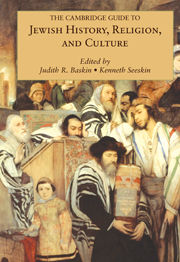Book contents
- Frontmatter
- Contents
- List of Figures and Tables
- List of Maps
- Contributors
- Acknowledgments
- The Cambridge Guide to Jewish History, Religion, and Culture
- Introduction
- 1 The Hebrew Bible and the Early History of Israel
- 2 The Second Temple Period
- 3 The Rabbinic Movement
- 4 The Jewish Experience in the Muslim World
- 5 Jewish Life in Western Christendom
- 6 Jews and Judaism in Early Modern Europe
- 7 European Jewry: 1800–1933
- 8 Jews and Judaism in the United States
- 9 The Shoah and Its Legacies
- 10 The Founding of Modern Israel and the Arab–Israeli Conflict
- 11 Judaism as a Religious System
- 12 The Centrality of Talmud
- 13 Jewish Worship and Liturgy
- 14 Jewish Private Life: Gender, Marriage, and the Lives of Women
- 15 Jewish Philosophy
- 16 Jewish Mysticism
- 17 Modern Jewish Thought
- 18 Contemporary Forms of Judaism
- 19 Jewish Popular Culture
- 20 Aspects of Israeli Society
- 21 The Future of World Jewish Communities
- Glossary
- Timeline
- Index
- References
16 - Jewish Mysticism
Published online by Cambridge University Press: 05 May 2015
- Frontmatter
- Contents
- List of Figures and Tables
- List of Maps
- Contributors
- Acknowledgments
- The Cambridge Guide to Jewish History, Religion, and Culture
- Introduction
- 1 The Hebrew Bible and the Early History of Israel
- 2 The Second Temple Period
- 3 The Rabbinic Movement
- 4 The Jewish Experience in the Muslim World
- 5 Jewish Life in Western Christendom
- 6 Jews and Judaism in Early Modern Europe
- 7 European Jewry: 1800–1933
- 8 Jews and Judaism in the United States
- 9 The Shoah and Its Legacies
- 10 The Founding of Modern Israel and the Arab–Israeli Conflict
- 11 Judaism as a Religious System
- 12 The Centrality of Talmud
- 13 Jewish Worship and Liturgy
- 14 Jewish Private Life: Gender, Marriage, and the Lives of Women
- 15 Jewish Philosophy
- 16 Jewish Mysticism
- 17 Modern Jewish Thought
- 18 Contemporary Forms of Judaism
- 19 Jewish Popular Culture
- 20 Aspects of Israeli Society
- 21 The Future of World Jewish Communities
- Glossary
- Timeline
- Index
- References
Summary
WHAT IS JEWISH MYSTICISM?
Narrowly defined, “mysticism” refers to a religious experience that involves a paranormal state of consciousness in which the human subject encounters or unites with ultimate reality. The experience is said to yield knowledge of truth that leads to salvation, is highly emotional, and commonly involves some form of illumination (sensual, supersensual, or metaphorical). Heightened concentration that reduces normal thoughts and images usually precedes a mystical experience; the experience itself is characterized by a loss of time and space, a loss of self-identity, and intense joy and bliss.
Scholars once assumed that mysticism was the same in all world religions. In the twentieth century, however, comparative scholarship established that mysticism cannot be extricated from its cultural matrix; culture not only colors the mystic's interpretation of a given experience but also shapes the very content of the experience. Although mystical traditions share certain features, their cultural specificity requires that they be studied in the appropriate historical, sociocultural context.
Mystical traditions consist of speculative doctrines, ethical values, literary texts, rituals, and social institutions. The relationship between mysticism and the religious tradition within which it functions is complex: A mystical strand may express the values of the tradition in a heightened manner, challenge and conflict with certain aspects of the tradition, or offer innovative and creative ways to interpret it. A given mystical tradition becomes distinguishable from other aspects of the religion when mystics generate an intellectual discourse with distinctive vocabulary, intellectual concerns, canonic texts, and authoritative interpretations.
- Type
- Chapter
- Information
- The Cambridge Guide to Jewish History, Religion, and Culture , pp. 399 - 423Publisher: Cambridge University PressPrint publication year: 2010
References
- 2
- Cited by

